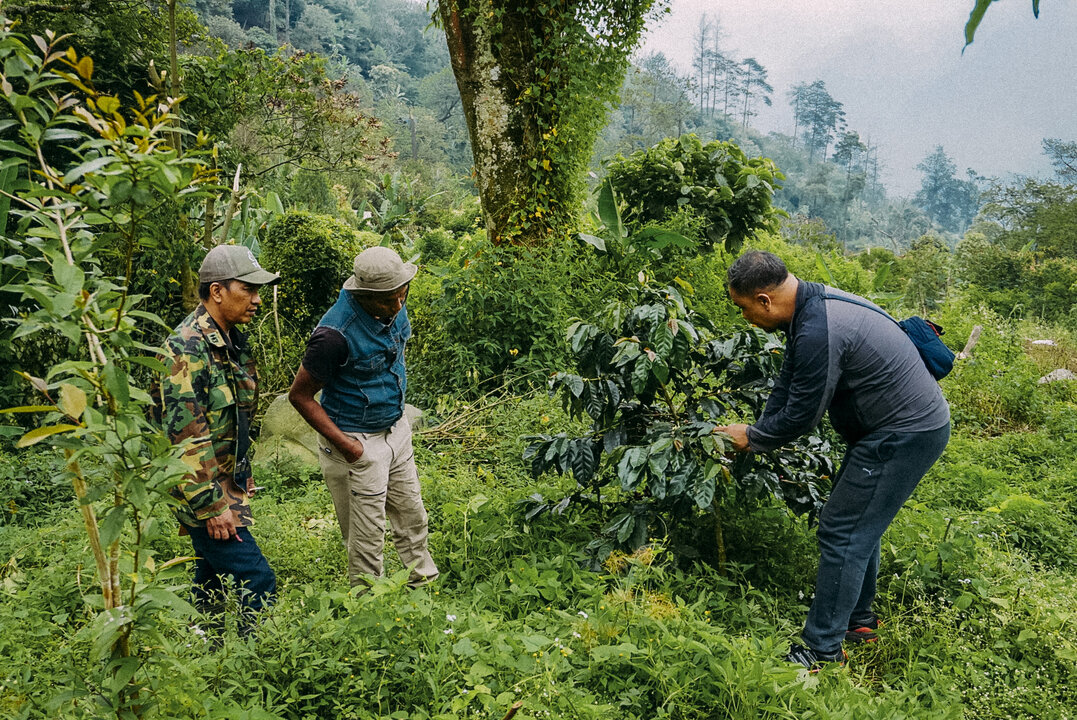A natural supermarket in the forests of Soreang

By: Fabienne Michaelis, Intern at TREEO 2023
During my internship and marketing activities, I had the privilege of experiencing first-hand a TREEO project in Indonesia. Our journey began on Wednesday, June 14, from Bali to a unique and remote location in the Bandung region, in West Java.
With no clear idea of what to expect, I kept my eyes eagerly open and my camera in hand. We finally set off in the early evening to visit the office of one of our tree-planting partners (TPP), "Trees4Trees" (T4T), to discuss the days ahead and the challenges that exist. These challenges include a weak GPS signal in some areas, which is essential for monitoring individual trees. This limitation significantly hindered the farmers' work this year, and TREEO was determined to resolve this issue as soon as possible. Another concern was the loss of a significant number of seedlings during the planting process caused by difficult distribution to remote areas and unpredictable weather conditions. In order to achieve our project goals, it is essential to replant these trees.
Field Trip Day 1
The next morning, we set out for the region where the farmers live and where parts of the project are implemented. Accompanied by our TPP manager, Linda, as well as Ardi (Customer Success - Indonesia) and Anorld (Customer Success - Uganda), we formed a strong team and met with the farmers that work with T4T to work together on solutions to the existing issues.
After several hours of discussing the challenges on the ground and regaining our strength with a lovely prepared meal, we were invited to visit a small coffee plantation that provides additional income to the farmers. The process from planting to processing the beans was vividly explained to us, and we had the pleasure of tasting the intense and delicious flavor of the coffee.
I learned that the projects not only aim to plant trees, but also add value to the farmers' additional income. Growing coffee plants provides an additional benefit to the farmers and TREEO in the future, as the annual pruning of the plants can also provide additional material for the production of biochar.
Our next destination that day was a visit to the T4T nursery, which recently opened and has significantly more capacity to grow seedlings. It focuses on one type of plant at a time, and so we were able to observe avocados being cultivated while thousands of young trees were being raised.
We talked to the staff about their work, and T4T had some junior high school interns on site who are majoring in forestry and agriculture to get some hands-on experience on-site. It was great to see that they had the opportunity to gain experience and really valued their time at the nursery. Since Bandung is known for its mild climate and is surrounded by many mountains and volcanoes, rain showers are not uncommon even in the Indonesian dry season, creating optimal conditions for planting almost any species. This was also the case this late afternoon and we got to experience the real Bandung climate. When the rain started, we concluded our work day.
Field Trip Day 2
Equipped with long clothes and sports shoes, we got ready to tackle and solve the challenges in the field. We hiked through the forest located on the mountainside, along a small beekeeping farm where we were allowed to taste fresh honey from a storage cell. After a while, we reached one of the areas where T4T farmers plant trees with TREEO: a small clearing in the mountains that is well vegetated, and water hoses are laid everywhere in the jungle to irrigate the trees on sunny days. I was impressed by the rich biodiversity. The farmers explained that it is like a "natural supermarket" where you can find everything from avocados, papayas, mangoes, and bananas to coffee. The only difference, they said, is that you can also harvest them yourself.
With such a wide variety of plants, it wasn't easy to know which trees to scan, but the farmers had less trouble with it than I did. Our Customer Success team had the opportunity to test a Bluetooth GPS, which proved to be particularly helpful in monitoring individual trees for the farmers, guaranteeing a GPS signal even in extremely remote locations. Due to the TPP's agreement to replant the remaining plants, we successfully resolved the other issue as well. Their direct access to a nursery undoubtedly gives them a significant edge in this regard.
Before the rain drove us home once again, we had the opportunity to visit the recently launched biochar production facility where initial tests are being conducted to demonstrate the use of biochar for soil amendment. The difference between plants using biochar as a soil amendment and regular fertilizing methods was clearly visible in this early growth stage. However, the exact benefits of using biochar for improved soil fertility and nutrient availability will have to wait until a later stage to be accurately assessed.
On the flight back to Bali, I tried to reflect on my first field trip and found the experience very helpful in getting a feel for the situation on the ground, where linear planting is not possible due to various factors such as the often unpredictable weather or topographical conditions. The direct contact with the farmers and their motivation and expertise to implement TREEO projects to the best of their ability fascinated me. It will stay in my memories for a long time.